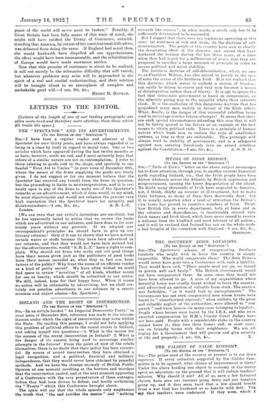IRELAND AND THE RIGHT OF INSURRECTION. [To THE EDITOR or
TIM " Bnernoa."] Seta,—In an article headed " An Imperial Democratic Party," in your issue of December 31st, reference was made to the circum- stances under which the right of insurrection may arise within the State. On reading this passage, I could not help applying this problem of political ethics to the recent events in Ireland, and asking myself two questions :-1. What is the reason for the success of the recent insurrection in Ireland? 2. What is the danger of its success being used to encourage similar attempts in the future? From tho point of view of the rebels themselves, there is no doubt that their policy has been success- ful. By means of armed insurrection they have obtained a legal recognition, and a political, financial and military independence, that they would never have obtained by peaceful methods. And we have the strange anomaly of British Public Opinion at one moment revolting at the horrors and murders that the insurrection caused, and at the next moment approving of a Conference with the very perpetrators of these outrages, before they had been driven to defeat, and loudly acclaiming the " Treaty " which this Conference brought about. -
The cynic will say that the whole episode only emphasizes the truth that "the end justifies the means " and "nothing succeeds like success"; in other words, a revolt only has to be sufficiently determined to be successful.
But I suggest that there were two tendencies operating in this case: (a) weariness of war and strife, (b) the doctrine of self- determination. The people of this country have seen so clearly the devastating effect of the disputes and unrest that have darkened the horizon during the last three years, at a time when they had hoped for a millennium of peace, that they are prepared to sacrifice a large measure of principle in order to secure political and social stability.
The insidious doctrine of self-determination, which we owe to ex-President Wilson, has also served to justify in the eyes of some the action of the Southern Irish. It is not realized that this doctrine, which seems to embody a system of freedom, can easily be driven to excess and very soon becomes a means of disintegration rather than of liberty. It is apt to ignore the fact that democratic government is based on compromise, on the minority giving way to the majority where their interests clash. It is the exaltation of this dangerous doctrine that has prejudiced many men unduly in favour of the Irish rebels. What, finally, is the danger of this successful rebellion being used to encourage similar future attempts? It seems that there are such special circumstances attending this case that it will not be lightly quoted in the future as an example of the beet means to obtain political ends. There is a principle of human nature which leads men to endure the evils of established systems, as long as they are endurable. This principle will always tend to stability of government, and is a safeguard against men entering frivolously into an armed rebellion
against the Constitution.—I am, Sir, &c., A. G. R. G.


































 Previous page
Previous page